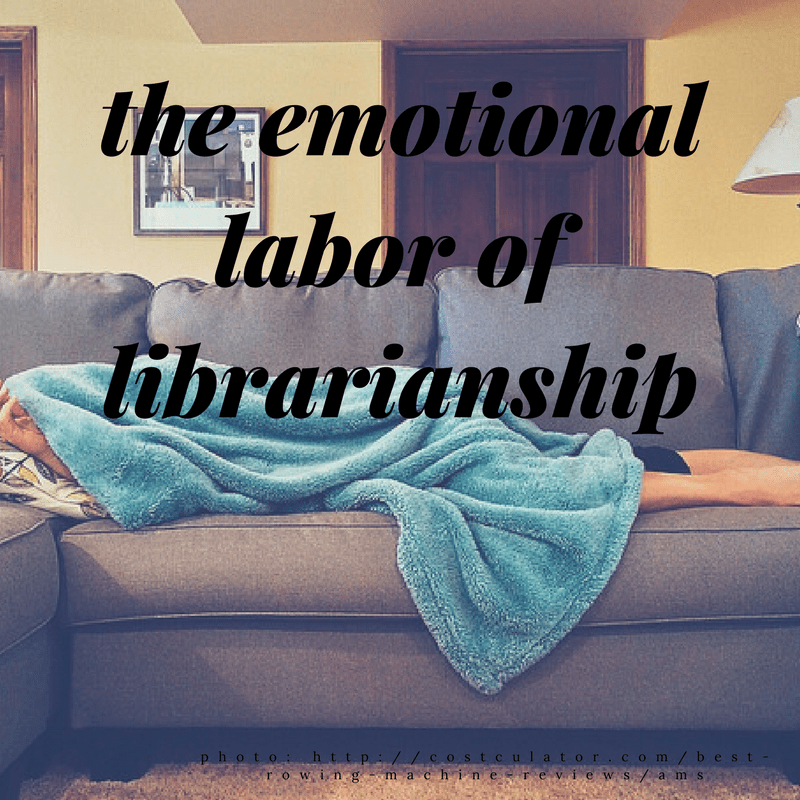Librarianship isn’t what you might call a physically demanding profession. Youth librarians do exert quite a bit of energy–I regularly hit 6000 steps during a day of book talks, and if I’m not sweating at the end of my toddler time then I feel like I’ve failed as a presenter–but compared to, say, my stint as a family farm hand or my time as a motel housekeeper (tip your hotel housekeeping staff, please), it’s definitely on the lower end of physically demanding work.
But what about the mental and emotional work that librarians have to do? I’ve been thinking a lot lately (and always, honestly), about women’s work, emotional labor, and the mental load–that last being a fairly new way for me to consider a workload I’ve been managing for years.
When I was a preschool teacher, I remember being physically exhausted at the end of most days, but more than that, I remember being emotionally bereft. I had a dozen small children clinging to me physically and emotionally from 8 in the morning until 6 at night. They turned to me for comfort, reassurance, support, and I was happy to give it when they were in my care.
But then I would go home, and have very little left for myself. I’d given everything I had to these children, and had no one in my life who could do the same for me, other than my cat and my small group of friends. As someone who was already depleted from a childhood of living with abusive, alcoholic parents, this was not a good situation.
When I made the career change from early childhood education to librarianship, I expected that my emotional reserves would be better protected. This was true, to a certain extent, but as time has gone on and I’ve assessed my experiences, I realize my emotional workload is probably the same, if not more, because in my library work I often have to do emotional labor for management and administration as well as for my patrons.
Just being in a customer service position, and having to smile in the face of everything from indifference to hostility, can take a toll on employees, especially women. This expectation that when serving the public, or discussing important work issues with colleagues, or advocating for more staff or more money, that women will be pleasant, quiet, and calm, is damaging. This quote is about attorneys, but could easily apply to librarians:
Jennifer Pierce, a University of Minnesota sociologist, found that the expectations for emotional labor in the legal profession apply to women working in every part of the field. In other words, while male attorneys—generally speaking—are allowed and even expected to be aggressive and domineering, that does not extend to female attorneys, who are frequently penalized if they attempt to conform to these emotional norms.
To take this further, think about even the most innocuous seeming reader’s advisory interaction. Have you ever done a reader’s advisory interview with a parent who is trying to get a book for their child from a school list or list from some Educational Conglomerate, where all of the books are twenty years old and often out of print, and no other options will do because the parent has this list, and been promised that this list and this list alone is what will help their child be successful? Think on how stressful that is, for the parent, and you, and eventually the child who ultimately must read this book that is impossible to find.
Or simply helping someone with the printer, and they start telling you about how they really need to get these naturalization papers printed and submitted because they’re terrified that their spouse will be deported by the new administration.
Or having to console a school age child who is attending a library program independently, and makes a mistake on his project, and becomes inconsolable, and his parent is nowhere to be found.
Or as a storytime presenter, programmer, and outreach person, think about all of the time you must be ON and ON STAGE. It’s not just happy good fun times presenting a program or reading books. It’s 30-60 minutes of being the focal point of a group, having to shepherd kids and families from one task to another, transitioning from a song to a story to a fingerplay, getting and holding the attention of large groups of children. As an introvert, the hours I spend in front of audiences, giving of myself, needs to be balanced by enough time being on my own, and replenish my emotional well.
Think about this in terms of a profession that is made up primarily of women, but more often has men has managers and decision makers. Do they understand the toll that emotional labor is taking on their female reports? Are they even aware that it’s happening, and do they care? Is it possible to make your library’s leadership understand this issue?
I’m exhausted. Aren’t you?
edited to add: I’d be interested in hearing about this from the perspective of a librarian of color; I expect the workload there is even more intense.

Leave a comment